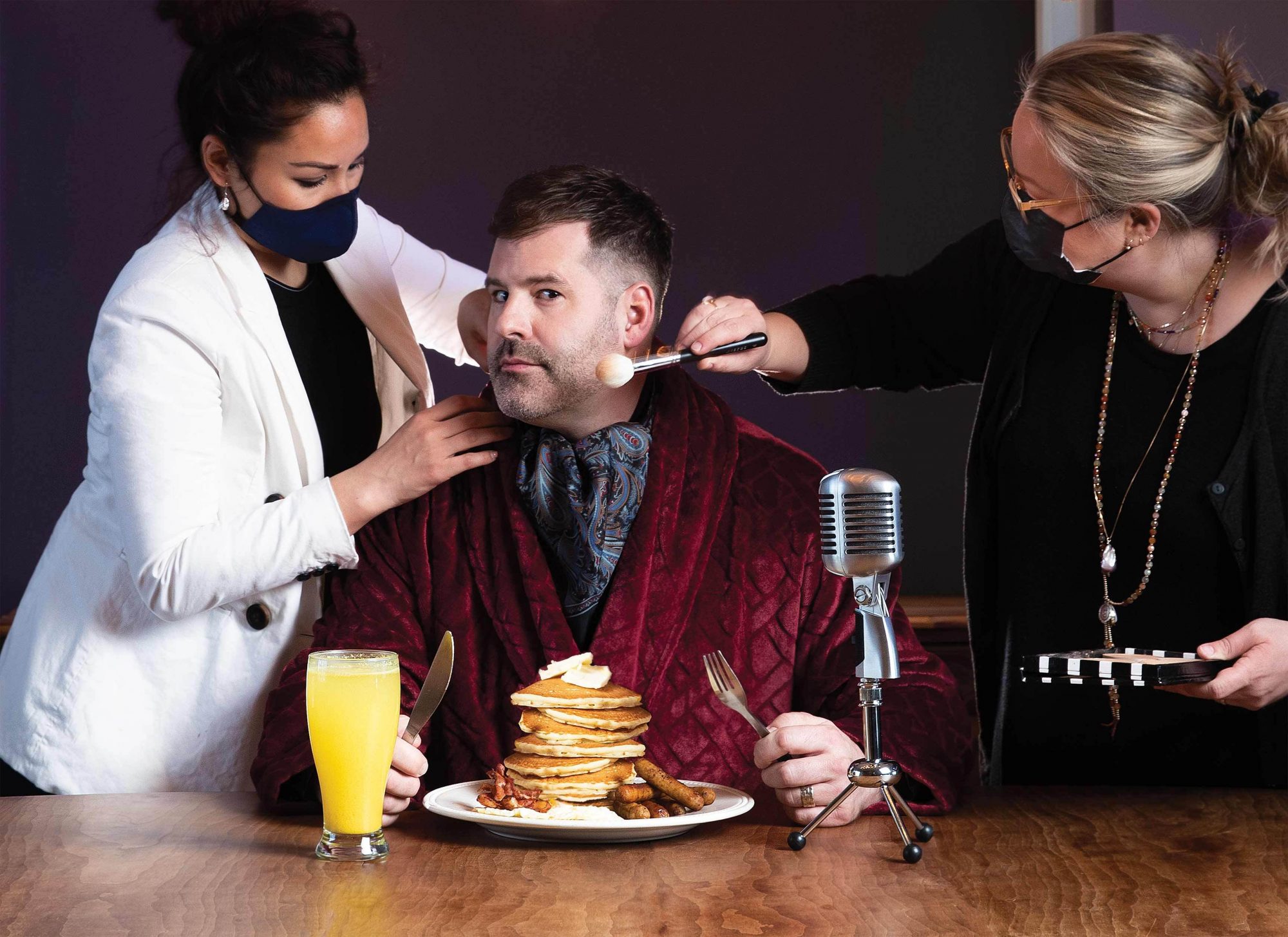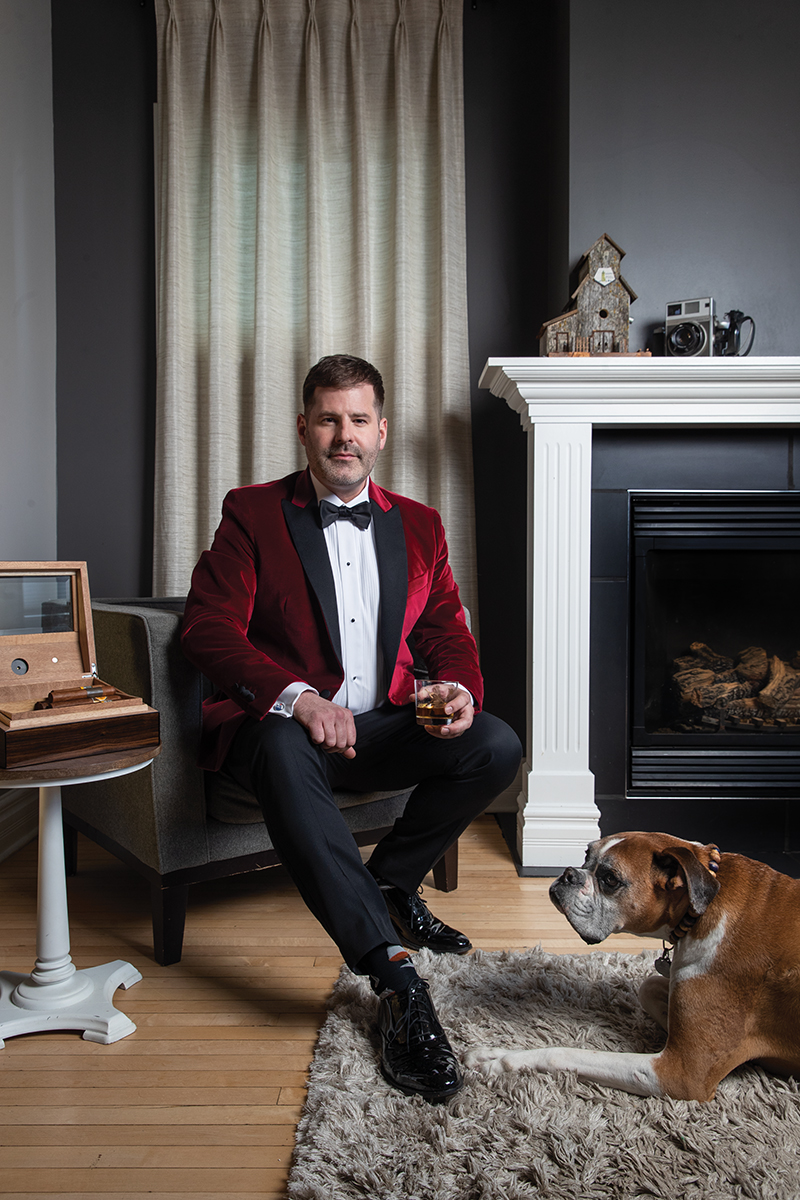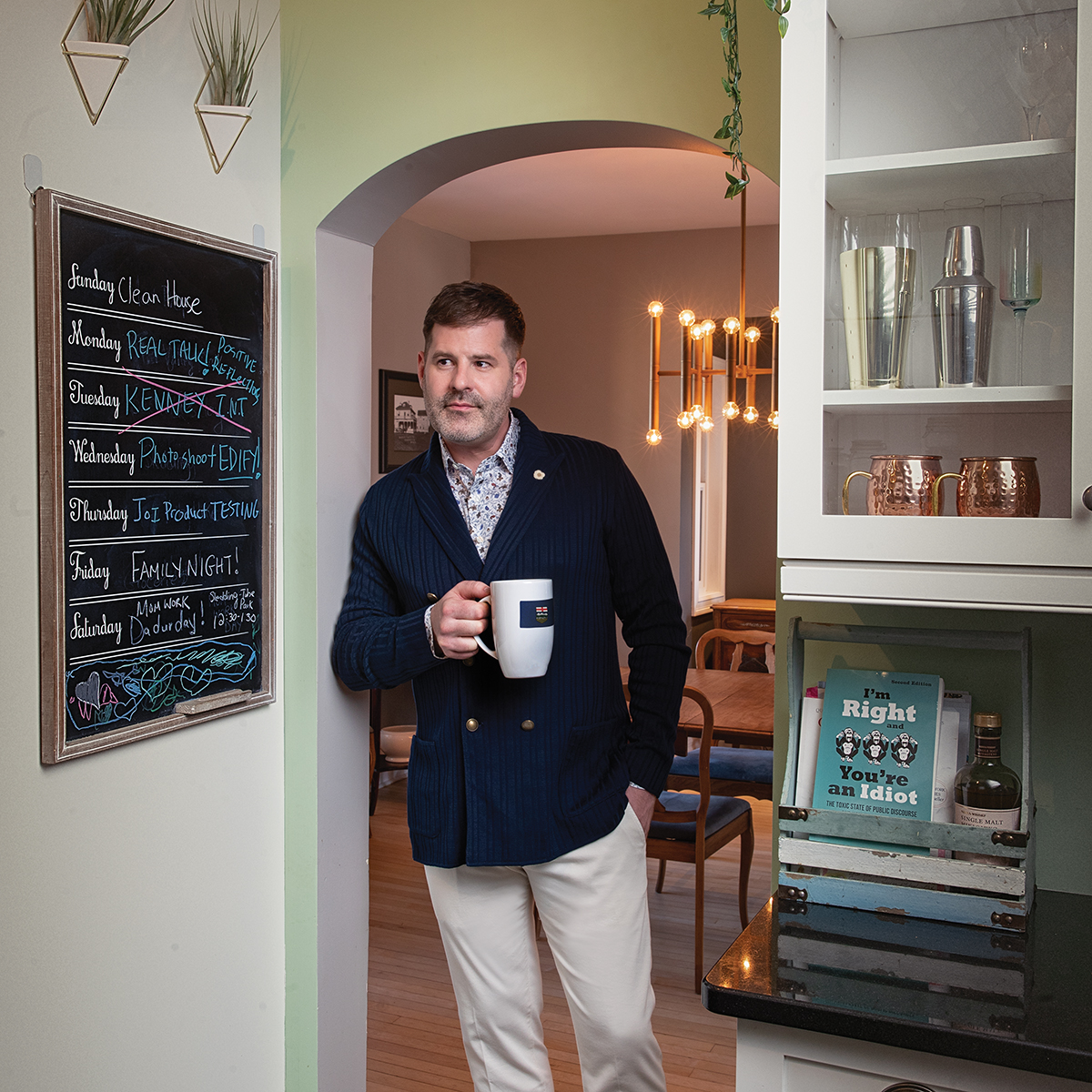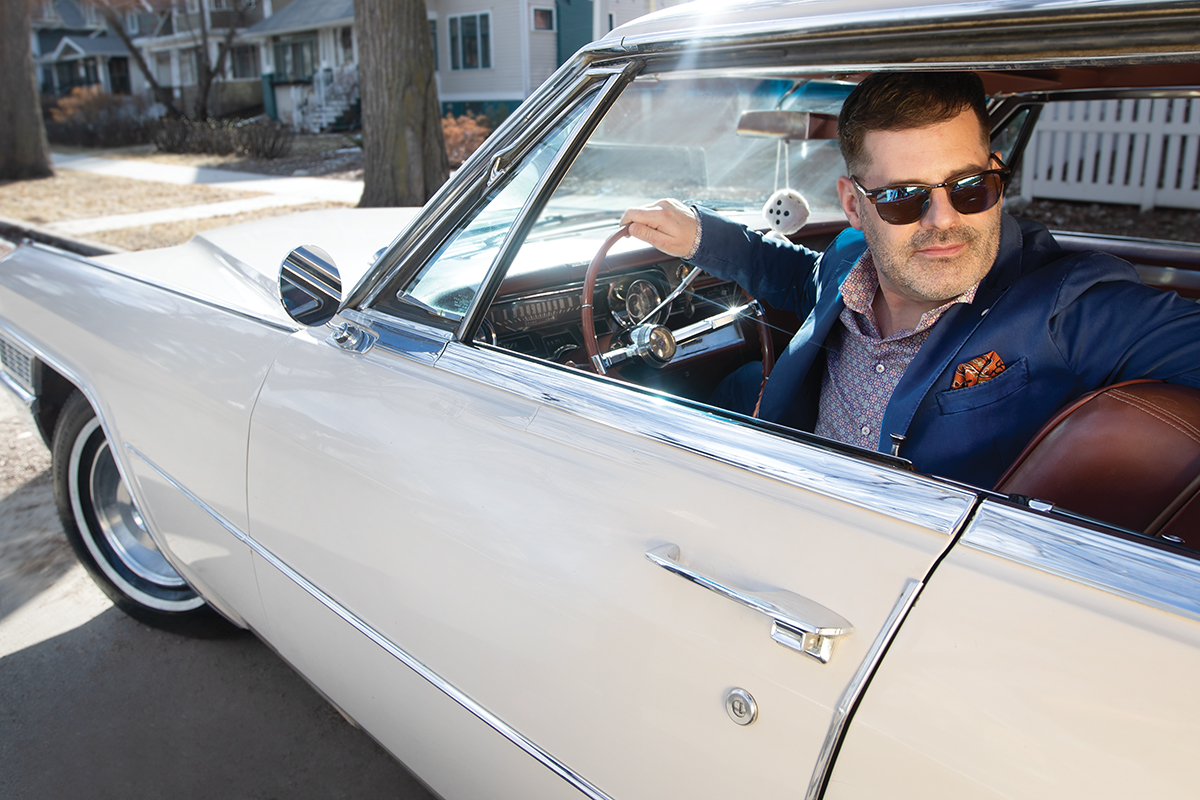
“Aloha, and good morning,” Ryan Jespersen boomed to open the 28th episode of his new podcast Real Talk, and his first show of 2021.
With rousing rhetoric betraying his childhood hero-worship of evangelist Billy Graham, Jespersen’s monologue captured the collective dismay of pandemic-weary Albertans, starting the new year with an insult: The United Conservative Party holiday travel scandal, rapidly dubbed “Alohagate” by political pundits.
Jespersen had never seen his “fellow Albertans” so angry. He legitimized their feelings of shock and fury. Looking into the camera live streaming his show on YouTube, he let fly, clutching a pen and gesturing with clenched fists.
“Some of you have lost family members to this pandemic, and you’ve lost them through glass!” he said, his voice rising from deep in his diaphragm.
“Your final visits through windows! Your final words to them, their final words on planet Earth over FaceTime! You’ve mourned their loss over Zoom! … Now you’re finding out that a bunch of politicians… didn’t seem to give a damn about obvious, clearly stated, long-standing travel advisories.”
Broadcasting from his tiny studio just north of Edmonton’s Brewery District, Jespersen’s outrage over the brazen scandal, his empathy for those afflicted by the pandemic, was no doubt genuine. But the media man in him could have been forgiven for relishing just a little in the colossal government screw-up. Here, the UCP government, in whose side Jespersen had been a thorn for more than a year, had given him solid gold for Real Talk’s first broadcast of 2021, the first of its first new year.
The Alohagate episode has been viewed or downloaded more than 60,000 times.
In it, Jespersen acknowledged 2020 as a “shit year.” COVID-19 made it so for everybody. A “public and serious career disruption” made it more so for Jespersen.
Months later, he’s looking forward with optimism, and a vision of fresh opportunity.

The 44-year old radio host, a married father of one, was at the top of his game in September 2020.
Jespersen was in the sixth year of his dream job as the morning talk host on 630 CHED, after rising through the ranks of local radio and TV media.
Then, during a segment in which Jespersen was criticizing Edmonton city councillor Mike Nickel, he dropped the “C” word. “He’s got a couple chimpanzees running his social media,” he said.
Fallout was swift. Nickel said the “tone deaf” comment racialized his staff. Jespersen was suspended, then fired — over the phone.
“It was a public hanging in the absence of public outrage,” Jespersen says in an interview, adding he didn’t utter the comment with any racial intention. He discusses the subject candidly. He’s not scripted. The allegation still hurts.
“Conversations around visible minorities, around equality, with trans people, about use of pronouns, about police brutality or with Indigenous people who want to talk about the Indian Act or clean drinking water… you look at it over the course of my body of work over 15 years, I’ve had hundreds of those conversations because I deeply care,” he says.
He seems remarkably unbitter about the departure from CHED.
“I’m really proud of what we did over the six years there,” he says. “I’m grateful Corus gave me an opportunity to build my brand and to build my name, no strings attached.”
Jespersen’s firing also came amid a prolonged estrangement with some Alberta conservatives, including Alberta’s UCP government and Premier Jason Kenney.
His on-air demand during the 2019 provincial election — for Kenney to dismiss a UCP candidate over his views on homosexuality — drew a line in the sand.
“I pulled no punches. Kenney didn’t like it,” Jespersen says.
He first met Kenney at a private political event at the Jespersen family home in the 1990s. Kenney was first elected to the House of Commons in 1997 as a Reform Party MP for Calgary Southeast. “My family were huge supporters for many years. We had the biggest Kenney sign on the block on our front lawn. I never had a real personal problem with Jason Kenney,” he says, adding he once thought Kenney would make a “formidable federal leader.”

But following his demand, Jespersen “got some messages from people within the party that were letting me know he wasn’t going to talk to me anymore, and sure enough, he hasn’t. I think my integrity and my decency pushed me into a position of being the antagonist to this provincial government. History will look back favourably upon the position that I took.”
Jespersen was raised in deeply conservative and religious surroundings in Calgary. He attended a private Christian school until high school and Trinity Western University, and grew up reading Alberta Report and listening to conservative radio icons Dave Rutherford and Charles Adler.
“Talk radio had always been something that intrigued me,” he says. “I benefited from it with regards to developing and hammering out my own perspectives.”
As he matured, Jespersen would begin to turn away from the social conservatism of his youth — he now describes himself as a small-p, small-c progressive conservative, and isn’t a member of any political party — and from religion, too.
“There were just too many questions that I couldn’t explain away; I found the explanations to be insufficient,” he says, adding he remains a spiritual person.
“It’s the same exercise that I ask people to undertake every show: Take your long-held beliefs and be willing to challenge them and put them to the test, and if they withstand the test, then you can feel like your beliefs have been strengthened, and you can continue to believe that with confidence.”
Back in 1981, Graham’s weeklong “crusade” at Calgary’s McMahon Stadium drew 164,000 people — a young Jespersen among them. Forty years later, Jespersen’s own community of “real talkers” isn’t looking for religious salvation — but many of them are looking for something, or someone, to believe in.
“I feel like what’s happening here is very special,” he says. “It’s a show for people who classify themselves as politically homeless.”

Real Talk launched less than two months after Jespersen’s departure from CHED. It was an idea he’d had before, but his contract prevented him from exploring podcasts.
“People are moving away from terrestrial radio. I was very well aware of this as someone who was fighting to keep audience share on a dying medium,” he says.
Real Talk immediately shot to the top of Canadian popularity charts and quickly hit the half-million download milestone. The show is funded through advertising and Patreon pledges, and built around four “pillars of accountability.”
“There’s my own integrity, our audience, our advertisers and the laws of the land. But with regards to corporate sensitivities, I can interview people and say things now that I could never have before,” he says. “I just make a commitment to keep it real and I’ll continue to do that.”
In an increasingly competitive broadcasting medium, authenticity equates to relevance.
“Are you going to have a meaningful conversation about religion, or about political policy or about social justice, or about marriage equality, or about systemic racism without your personal perspective coming into the mix?” Jespersen asks.
“Obviously it’s going to be relevant, or your show’s boring.” Jespersen doesn’t overthink what he says, but with off-the-cuff candour comes risk.
He recalls a “teachable moment” during that Alohagate episode. “I was running my mouth and at one point said, ‘I feel like I’m taking crazy pills!’ I was quoting Will Ferrell in Zoolander. And kinda right when I said it I felt, ‘Umm, I don’t know about that one.’ But I kept going.”
Sure enough, Jespersen was contacted by a disability advocate who told him that was ableist language and urged him to use his position to influence or change public perception.
“I had her on the show the next day and we had a wonderful conversation about it. And I want that to be a demonstration to the audience of the commitment that I have.”
Jespersen is easygoing as he discusses his new creation. He’s in a better headspace as an entrepreneur.
“I used to come into work at a big multi-million dollar studio, open up the text line and it would be just horrible messages all morning long. The minute I sat down at work I’d be hearing what a dumb asshole I am,” he says soberly.
“Cut to Real Talk,” he says, gesturing around his studio, adorned with brightly coloured artwork by Edmonton artist Jay Bigam, a beer fridge in the corner and the “ON AIR” sign glowing red.
“We walk into a studio we’ve bootstrapped, that’s supported by citizens that care about meaningful conversation and journalism. When we go live on YouTube the comments are like, ‘Good morning, excited for the show, how’s everybody doing?’ People are treating each
other normally,” he says.
“It’s hard to explain what it’s like to have the support of the people that we do, advertisers and listeners.”
In a sense, Jespersen’s story is of someone who refuses to be cancelled.
“I honestly don’t weep for what’s lost or what was taken. In every element, in every context, my life is better now,” he says.
“I guess ultimately the only way that I can get cancelled now is if the audience just stops showing up. Nobody’s going to fire me. I’ve been unshackled.”
HAIR AND MAKEUP TIIU VUORENSOLA
ALYSSA HABCHI
HENRY SINGER; BATHROBE SIMONS; SCARF SWISH;
SUNGLASSES MILLCREEK OPTOMETRY CENTRE
This article appears in the May 2021 issue of Edify








